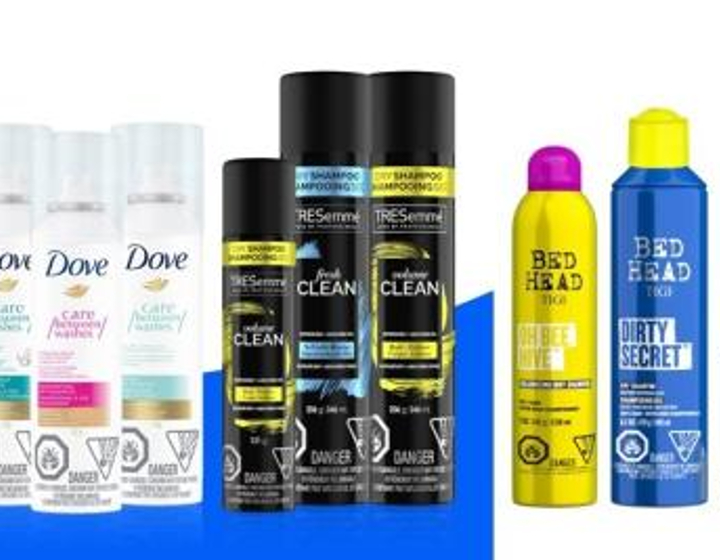Cancer experts are calling on companies selling personal care products to increase their vigilance and testing for toxic chemicals after a mass recall of dry shampoo in Canada this week.

On Tuesday, Unilever and Health Canada announced a recall that included more than 1.5 million dry shampoo products manufactured by Dove, Bed Head and Tresemmé due to the detection of benzene, a cancer-causing chemical.
This is not the first time benzene has been detected in personal care products, such as dry shampoo, deodorants and aerosol spray sunscreens in Canada, prompting a safety recall.
In December 2021, more than 800,000 units of dry shampoo and conditioner aerosol spray products by Herbal Essence and Pantene were also recalled over benzene detection.
Also in November last year, approximately 1.4 million units of Old Spice and Secret anti-perspirants were part of another benzene-related recall.

In fact, over the past two years, at least 12 recalls have been related to aerosol spray products and elevated levels of benzene, according to Health Canada’s records.
Paul Demers, director of the Occupational Cancer Research Center and a professor at the University of Toronto, said it is concerning to see the trend.
“It’s not something that’s supposed to end up in personal care products,” he said. “That’s just bad production to do that.
“You certainly don’t want to be spraying it at your body or putting it in your hair.”
Here is what you should know.
What is benzene?
Benzene is a sweet-smelling, colourless or light yellow liquid chemical.

Get weekly health news
The toxic and highly flammable chemical is formed naturally and by human activities.
Benzene is used to produce other chemicals involved in the production of plastics, resins, nylon, synthetic fibers, as well as lubricants, rubbers, dyes, detergent, drugs and pesticides.
In Canada, ambient and indoor air are the primary source of human exposure to benzene.
In the United States, benzene is widely used and ranks in the top 20 chemicals for production volume, according to the CDC.

Why was benzene detected in dry shampoo?
Ivan Litvinov, a dermatologist and a scientist in the Cancer Research Program at the Research Institute of McGill University Health Centre (MUHC) said he was not surprised by the recent recall.
His own research has highlighted that benzene contamination is nothing new and the chemical is known to have contaminated many personal care products in recent years.
“Benzene is unavoidable and we are exposed to it, whether we want it or not,” he said.
Unilever Canada said it does not use benzene as an ingredient in its products.
In a statement announcing the recall, the distributor said an internal investigation identified the aerosol propellant as the source for “potentially elevated levels of benzene” in several lots of dry shampoo products.
Litvinov said where the source materials come from and the production process might be causing elevated levels of benzene.
“We think that it’s a contamination from source materials … because benzene is not really inherent to the product itself.”
What are the risks?
Benzene is a carcinogen and exposure to the chemical by inhalation or absorption, through the mouth or skin, can result in leukemia, blood cancer of the bone marrow, and blood disorders which can be life-threatening, according to Health Canada.
However, “daily exposure to benzene in the recalled products at the levels detected in testing would not be expected to cause adverse health consequences,” the agency said.
Demers said the risk of benzene exposure from using a hair product was not a cause for major concern.
“It’s not something I would worry about from having used the hair spray a few times or even for a few weeks or a few months,” he told Global News Friday.
The short-term effects associated with high levels of benzene include dizziness, drowsiness, headaches or even unconsciousness, said Demers.
Whereas years of exposure to even low levels of benzene can cause leukemia, he warned.

In addition, there is some possibility that thrombocytopenia and a variety of immune diseases are also linked to benzene exposure, said Litvinov.
He said even though the overall risk from shampoo use maybe small, “there is no such thing as a safe exposure to benzene.”
Health Canada has urged consumers to immediately stop using the recalled products and dispose them in accordance with the instructions on the packaging.
- ‘Something just went off’: Canadians in Middle East describe ‘surreal’ Iran missile strikes
- Queen’s University students stranded in Doha after Iran attack shuts down airspace
- Iran begins search for new leader; U.S. military says 3 service members killed
- Khamenei’s death met with ‘jubilation’ among Iranian-Canadians: Liberal MP









Comments
Want to discuss? Please read our Commenting Policy first.